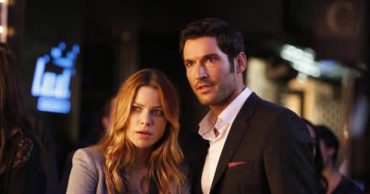
Forgiveness is such a profound conscious and unconscious state of affairs. You can’t actually choose to do it. It simply happens to you.” Although Bella has not arrived at forgiveness for what Hannibal did to her–took away her chosen path to death–forgiveness happens to Dr. Lecter in “Mizumono,” Hannibal‘s unbelievably good season two finale. Hannibal has given so much to Will: “I let you know me. See me. I gave you a rare gift. But you didn’t want it.” In spite of that, Will still betrays him. Hannibal knows it the second he catches the scent of Freddie Lounds on Will. And still…Hannibal is supposedly willing to forgive his once best friend: “Fate and circumstance have returned us to this moment when the teacup shatters. I forgive you, Will. Will you forgive me?”
What follows is the dessert–which is what the mizumono dish functions as within the kaiseki meal–to the bloodbath that is this finale. Hannibal asks Abigail to go to him and he slits her throat right in front of Will, just as Garret Jacob Hobbs did in the series pilot. There are far too many emotions to sift through in this scene, especially when viewed through each character’s perspective, but the one that stands out most powerfully to me is the pain of Will Graham. For all the machinations, gorgeous imagery, oppressive scoring and superb acting, Hannibal has always impressed me first and foremost for its uncanny ability to handle violence so intelligently in a television landscape littered with serial killer shows that often gloss over this aspect of their stories. Violence has destroyed Will Graham. Hannibal has guided that destruction, certainly, but even in another life where Will would never have met the doctor, it’s hard to imagine how well he could have handled all the horror that comes with his job and being hyper-empathetic. To see this–a recurrence of the most haunting act of violence in Will’s life–could understandably remove the will to live. Abigail has been somewhat of a lasting symbol for Will, even long after he thought she was dead. Regurgitating her ear is a disgusting nod to the suggestion that she has fused so fully into his being that it has become physical. She appears in the stream of his subconscious. She is the one he doesn’t want Freddie to write about, because in spite of the things her father persuaded her to do, Will still sees some amount of hope and innocence in her. Hannibal is (not surprisingly) smart to have kept her around. After seeing Miriam Lass return, I had a hunch we would see Abigail again, but I couldn’t have known she would be used as she is here–the final twist of the blade into Will. Her return will be shocking to many people (in that good kind of way that television can pull off so well sometimes), but more shocking is to see Will lose her all over again.
Everything that happens at Hannibal’s house at the end of this episode (which takes up about 18 minutes of screen time) is testament to what this series can do at its height, and I don’t hesitate to say that that version of the show is the pinnacle of television not just in 2014 but as a medium altogether. Director David Slade is working in absolute synchronicity with everyone else involved in the show, but especially composer Brian Reitzell, to produce something that transcends the form. Not even on cable would you see something like Hannibal, because it often occupies a place by itself. It is inarguably high art, capable of evoking the most powerful of emotional responses. I could say the fight scene between Will and Jack, which opened the season, is wonderfully choreographed (and it absolutely is), but Hannibal in its completeness is the version that comes back from the commercial break, once Abigail has pushed Alana through the window. The song that will take us all the way to the credits kicks in, and Slade hones in on every marvelous detail in every frame: the mixture of glass and raindrops around Alana’s body, the pooling of blood, the twitching of faces. The sequence is devastating from when Will pulls up in a cab to when he sees his stag take its last breath. Here is Hannibal, a man who has tormented the other main characters of this show for two full seasons. His actions have had permanent effects, and he has shattered countless lives that are off-screen in the homes of his victims. And here is the trap laid for him by the only people who have any shot at catching him. And there he goes, exiting his home and walking down the street in the cleansing rain as Will, Jack, Alana and Abigail all lie dying or dead (I’m going to assume Abigail is the only casualty at this point). Last season apparently wasn’t enough when Hannibal visited Will as the victor, putting Will into Chilton’s care. He gets to win again, flying off to France (presumably; he says his memory palace is in Palermo, Italy, but the flight he’s taking appears to be a French airline) with Bedelia Du Maurier. This may not be horror it the traditional sense of the genre, but it is horror in the most unfortunate and literal of ways.
Some of these moments in “Mizumono” hit so well because of the peripheral things going on, which has been Hannibal‘s calling card since day one. What’s most effective is the use of the sound design to bombard the viewer with the ticking of a clock and the patter of raindrops, which are not too dissimilar in terms of sound. Accompanying these inclusions is an occasional winding, as if there are several timers being set to go off later in the episode. As if the tension wasn’t already palpable, these devices give “Mizumono” a ridiculous amount of urgency in a way I have never experienced while watching television. People sometimes use the phrase “forgetting to breath” about a viewing experience, which I had previously found kind of silly. Color me dumb and wrong, Hannibal, because “Mizumono” reaches an inescapable crescendo. If there are people out there who were able to casually watch this, tell me now so that we can send a professional to check their sanity and ability to feel any kind of emotion. Other, smaller (not equally notable) technical flourishes are everywhere in the episode. Again, we see two faces collapse into one another in the cold open: Jack and Hannibal become one as do the two versions of Will Graham. When Hannibal tells Will that the chair he’s sitting in “holds among its molecules the vibrations of all our conversations ever held in its presence,” we can hear the faint whispers lingering like the voices of the dead. Alana envisions herself being overcome by the darkness of her nightmares, and we see her tear turn to blood, foreshadowing her fate to come. When Alana is pushed out the window, Slade frames one of the shots so that it looks like she’s falling upward into the top-right corner of the screen. All of these things help make an episode of Hannibal what it is, catapulting it so far beyond an average network show that the NBC logo is galaxies away.
Yet, the series (and this finale) is just as capable of telling a story as it is showing one. Two years ago, who would have thought that the television series bringing some of the most interesting and thought-provoking themes and issues to its discussions would be this one? As someone who spends a lot of time writing, I’m particularly keen to break down what Hannibal says about punctuation: “The punctuation at the end of a sentence gives meaning to every word, every space that precedes it.” This is, of course, a clear representation of how design functions in this series and with the character of Hannibal himself, but it’s a fascinating concept to apply more fully to life–that certain events can be altered by those that come after. Maybe what you thought was a full stop was only a semi-colon or a comma, and the rest of that sentence gains more meaning and relevance later, once that actual full stop comes about. It is easy for us, as people, to think in the here and now. Foresight is never very attractive when you are suffering through depression or pain, for instance. The now can be all-consuming. But events and periods in our lives become so much more than what they are in isolation. That is why nostalgia is such a powerful feeling. We rarely understand the full extent of something as we experience it. Time and the continuation of our stories help us get there.
In that same conversation with Bella, Hannibal says that “[l]ove and death are the great hinges on which all human sympathies turn. What we do for ourselves dies with us. What we do for others lives beyond us.” At various points throughout this season, Hannibal has seemed somewhat contradictory or, in some cases, hypocritical. He has plenty of philosophical musings, but he is often someone who acts counter to some of the ideas he espouses. Yet, in a very sick and twisted way, the things Hannibal “does” for others will definitely live beyond him. If there is a point when Will Graham is alive and Hannibal isn’t, the traces of Dr. Lecter will still be in every inch of Will’s life. The quotation also makes sense for Hannibal, given how necessarily private he is as a serial killer. The things he does for himself are usually kept to himself. This might actually be a hugely important character trait that separates Hannibal from many people. It is a mildly cynical thing to suggest, but people, as a current species, seem to find reasons to bring up some of the things they do for themselves as a means of either impressing others or validating their own efforts. Hannibal can’t do either of these without blowing his cover. His displays of his victims are meant to impress, but until Will, he had no means of tying those impressions to himself. This is how he expresses his love–through death.
For all its intriguing bits of dialog, though, “Mizumono” comes back down to the thing that has defined this story all along: the relationship of Will Graham and Hannibal Lecter. How many changes have we seen each go through? How many times has curiosity led them down a long path? How long has it been since they were friends? Were they ever friends? “The most beautiful quality of a true friendship is to understand and be understood with absolute clarity.” That is what Hannibal tells Jack, another character who has been suggested to be one of his friends. That line of dialog undoubtedly describes the Will-Hannibal relationship. If nothing else, they understand one another with absolute clarity. They may hide things from one another, but everything surfaces eventually. What a terrible way, then, to leave this friendship at the end of the season. Whatever the stag represents–Will himself, a specific part of Will, that aspect of Abigail that Will clings onto, empathy–it is now dead. Hannibal has killed it. The saying goes that we hurt the ones we love most of all. If this is true, the love Hannibal has for Will is endless.
Other Thoughts:
– Great transition from Will’s house on the ground to becoming a tree house when Garret Jacob Hobbs is there, asking if he sees while the dogs are barking at him. On that note, I’m also glad none of the dogs died this season, even though they now have a taste for Verger flesh. Ugh.
– Welcome back to Gina Torres, Cynthia Nixon and Kacey Rohl. All three are fantastic in this episode in their own ways. I especially like the nod to those viewers who have a hard time believing certain things in this series (which is totally appropriate) by having Kade explain to why Jack and Will deserve to be arrested. Outrageous government conduct. You got that right. More impressive from an acting standpoint, however, are watching Torres’ labored breathing and Rohl’s convulsions as Abigail bleeds out.
– “Reality doesn’t go away because you stop believing in it. It’s stubborn like that.” If ever there was a perfect way to describe this series…
– “They know.” This finale had tons of callbacks, this being one of the most memorable.
– Where is Jack, one might ask? “In the pantry.” Mads Mikkelsen’s delivery of this line is probably the only thing I can point to that retains the dark humor of Hannibal. It’s no surprise that there is very little of it in an episode that doesn’t feature Brian, Jimmy, Mason or Chilton.
– Standing ovation to Alana for pulling the trigger, even though there weren’t bullets in the gun. Was she aiming for a kill shot? Meh. As long as she was ready to put one in him. Less impressive is her “I found more bullets,” which wins the Captain Obvious award for dialog.
– “I didn’t know what else to do, so I just did what he told me.” Hannibal never gives me an excuse to talk about heavy metal, which is my preferred genre of music, but this line from Abigail made me compare Hannibal to Dr. X from Queensryche’s Operation: Mindcrime. Also, Abigail is the title of one of King Diamond’s best albums, which are almost all conceptual horror albums. Also, Hannibal mentions the imago in this finale, which he describes as the last stage of transformation and, within the field of psychoanalysis, an image of a loved one. For a great song titled “Imago” on an album that has to do with creation and becoming, of sorts, see Pain of Salvation’s BE. There. That’s it. I got a season’s worth of metal references in one bullet point. I am happy.
– That’s it for Hannibal season two. I’ve had enormous amounts of fun doing these reviews. Thank you to those who have been reading along. I said I would only do one shameless plug, but my co-host and I have decided to go back to season one of Hannibal to record podcasts for each of those episodes this summer. So, if you’re having Hannibal withdrawals, they will appear here (the podcast for this episode will go up either tomorrow or Monday; last week’s includes a discussion with Hannibal director Vincenzo Natali, who also directed Cube and Splice). Until then, take care, Fannibals.
[Photo via NBC]
 Follow Us
Follow Us





